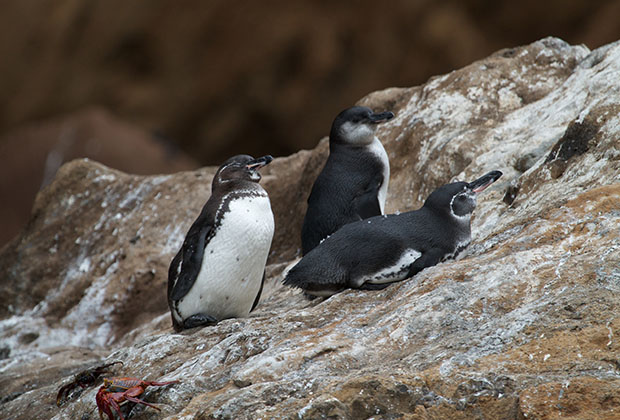
Science instructor Lisa Ellis was awarded this school year’s Anne-Marie Jenks Excellence in Teaching Award to pursue an enriching week-long trip to the Galápagos Islands this summer. Dean of Faculty and mathematics instructor Sandra O’Connor announced this year’s recipient to all employees through an email sent on Sunday, Dec. 6.
When Ellis first found out that she was this year’s recipient, she was ecstatic.
“I was kind of screaming. I was at home. It was the weekend, I think, and I yelled for my husband,” Ellis chuckled.
Founded during the 2012-2013 school year and established in honor of world languages instructor Anne-Marie Jenks for her 45 years of dedication to the School, the Award offers teachers the opportunity to pursue a one-of-a-kind opportunity for professional advancement. Teachers submit competitive applications detailing their plans for the $5000 grant to O’Connor and Head of Upper School and Assistant Head of School Laura Hotchkiss ’86 for review. O’Connor and Hotchkiss together then select one faculty member as the recipient of the prize. Last year, science instructor Jay Buckley received the award last year and traveled around the world to study invasive marine species.
O’Connor was especially struck by how Ellis detailed that she will be taken out of her comfort zone during her trip in the application. Neither Ellis nor her husband speak Spanish or have been to South America, much less south of the equator.
“She talks about being taken out of her comfort zone. That is one thing I can understand, too. …It’s just the culture that she’s going to be living in for the time she’s going to be there,” O’Connor shared.
Ellis has always wanted to go to the Galápagos Islands because many biologists consider the islands the birthplace of modern biology and a trip to the islands “a pilgrimage.” Famous English naturalist Charles Darwin first observed patterns of what later became his theory of natural selection and evolution at the Galápagos archipelago. He discovered differences among finches from island to island, noting their different beak lengths and shapes.
“I would almost think of [the Galápagos] as sort of a holy place in a way. It sounds kind of crazy to say that. It is kind of like, ‘This is where it all started,’ in a sense. Plus, what an incredible ecosystem, an incredibly unique ecosystem. I’ll be able to see penguins at the equator. I’ll be able to see species that are only found there and that have been extensively studied, but I’ll be actually able to see them in real life,” Ellis enthused.
Ellis’ own concerns for the fragile ecosystem and her own motion sickness at sea had forestalled her from packing her bags and booking her ticket to Ecuador; but when Ellis read an article in the LA Times about Pikaia Lodge, a hotel which brands itself as “the evolution of luxury eco-adventure in the Galápagos,” she said her concerns were assuaged. Not only does the Lodge reduce Ellis’ time at sea, but also it is dedicated to sustainability and its surrounding ecosystem. The Lodge has invested in many environmentally-friendly projects, including a wastewater treatment system, solar panels, passive solar heating and food composting to name a few.
“As co-head of the CEC, the Campus Environmental Committee, I thought it would be a good opportunity for me to see some stuff in action and learn stuff I could possibly take back to Marlborough. I think [the Lodge] was a big part of the decision because I definitely did not want to go to a place that was damaging the environment, and this place is trying very hard not to,” Ellis explained.
During her trip, while island hopping, Ellis looks forward the most to seeing the different species of tortoises, finches and marine iguanas. She is also excited to snorkel. Overall, Ellis is excited “to walk where Darwin walked and see the species that he saw.”
“I know all the intellectual stuff about the evolution and everything, but just to be in it and experience it and feel it just makes it so much more real. And having that experience I think will impact my teaching. I think I’ll be able to bring some of that back, and I’ll be able to take a lot of photographs,” Ellis said.
Ellis plans to integrate her personal experiences from the Galápagos in her AP Biology, Honors Biology, and Human Anatomy and Physiology classes through her own photographs, videos and stories. Ellis said she believes that using personal narratives in the classroom makes the curriculum more meaningful and lasting to students.
“I think people like stories. Like when I tell the story about Rosalind Franklin and Watson and Crick and the discovery of DNA. That’s much more memorable than ‘Here’s the structure of DNA’,” Ellis related.
Ellis hopes her plans for her trip will coincide with the School’s Strategic Planning Goal Four, which encourages teachers and students to engage locally and lead globally.
“I think the idea is to take learning in the whole Marlborough community beyond our campus. And that means for the students, but it also means for the faculty and staff. So, getting connected with things outside our little bubble is really important, and it could lead to, who knows, it could lead to possible international trips for students beyond what we’ve done in the past…,” Ellis explained.
O’Connor praises Ellis’ drive to learn and explore new things for herself then bring her experiences back to her students.
“Ms. Ellis is an amazing teacher and loves what she does. She has got this passion about what she teaches, and she just wants to develop more about her subject matter. So, this is one way for her to really delve into it and explore new options and see what she can bring back to the girls,” O’Connor commented.





